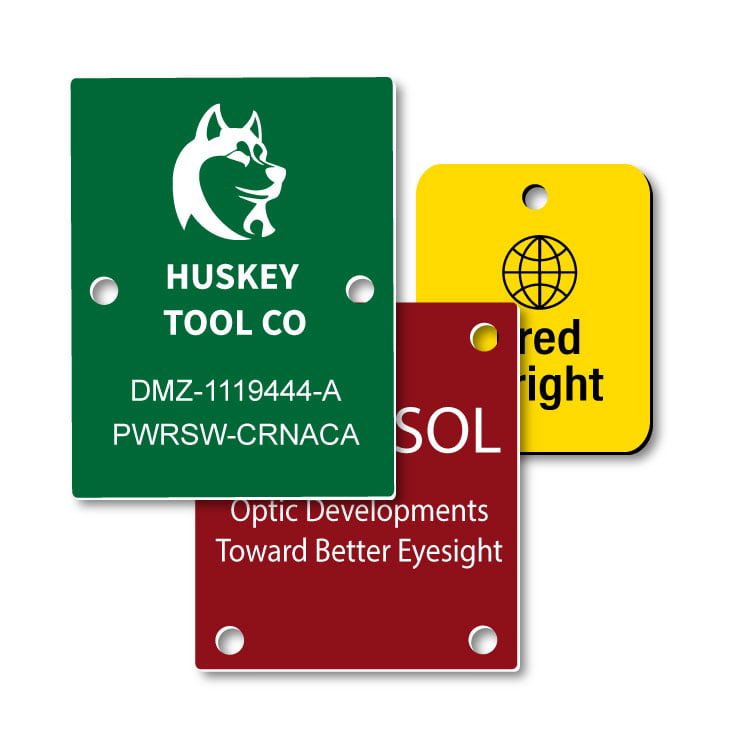Just How Plastic Nameplates Are Manufactured: A Comprehensive Guide to Their Manufacturing Process
The manufacturing of plastic nameplates involves a number of exact steps, starting from the option of ideal materials to the last finishing touches. Each phase is important, guaranteeing the product meets particular demands for sturdiness and aesthetic appeals. Different production techniques play a substantial duty in crafting these nameplates. Recognizing these processes can clarify the complexities behind what might appear like a basic product. What variables add to the high quality and customization of these nameplates?
Recognizing Plastic Products Used for Nameplates

The Style Refine: From Concept to Model
The design process for plastic nameplates starts with a clear idea that guides the total development. Developers collaborate with clients to specify the purpose, style, and specific requirements of the nameplate. This preliminary phase includes brainstorming sessions, mapping out concepts, and choosing shades and typefaces that line up with branding goals.Once the idea is developed, designers use computer-aided layout (CAD) software program to create thorough electronic depictions. These prototypes enable for visualization and modifications prior to progressing. Responses from stakeholders is essential during this stage, as it aids improve the design to meet expectations.After completing the electronic prototype, a physical design might be created, usually through methods like 3D printing. This concrete representation enables more evaluation of looks and functionality. Overall, the design procedure is a crucial action that lays the structure for the effective production of premium plastic nameplates.
Cutting and Forming the Plastic
In the cutting and shaping stage of plastic nameplate manufacturing, the choice of products plays an essential duty in establishing the final product's high quality and sturdiness (Plastic Nameplates). Different precision reducing strategies, such as laser cutting and CNC machining, guarantee that the plastic is formed with precision and uniformity. This mix of mindful product choice and progressed reducing methods is vital for producing high-quality nameplates

Material Selection Process
Selecting the right material is crucial for creating high-quality plastic nameplates. Numerous sorts of plastics are readily available, each offering distinct benefits and qualities. Usual choices consist of acrylic, polycarbonate, and PVC. Acrylic is preferred for its clearness and UV resistance, making it suitable for outside applications. Polycarbonate, understood for its longevity and effect resistance, is ideal for settings that call for enhanced security. PVC is often selected for its cost-effectiveness and flexibility in layout. The selection procedure also takes into consideration elements such as color, surface area, and thickness coating, which can greatly influence the last appearance and performance of the nameplate. Ultimately, the picked material needs to straighten with the intended use and visual objectives of the plastic nameplate.
Precision Trimming Strategies
While choosing the suitable material prepares, precision reducing techniques play a necessary duty in shaping the plastic nameplates right into their last forms. Different approaches, consisting of laser cutting, CNC milling, and pass away reducing, are utilized to attain accuracy and consistency. Laser reducing uses concentrated light to generate clean edges and complex designs, perfect for complicated patterns. CNC milling uses flexibility by eliminating excess material with accuracy, fitting different thicknesses and forms. Pass away cutting, on the other hand, permits automation of uniform items, boosting effectiveness. Each strategy is selected based on the layout specifications and the desired surface, making certain that the end product fulfills top quality requirements and customer expectations while maintaining longevity and visual charm.
Printing Strategies for Modification
Exactly how can manufacturers accomplish precise and vibrant layouts on plastic nameplates? The solution hinges on numerous printing methods tailored for personalization. Digital printing has actually acquired appeal as a result of its capability to produce high-resolution photos and intricate designs directly onto plastic surface areas. This approach permits fast turn-around times and minimal configuration prices, making it suitable for short runs and customized orders.Screen printing stays an additional commonly utilized method, particularly for bigger amounts. It includes developing a stencil and applying layers of ink, causing rich colors and toughness. UV printing, which utilizes ultraviolet light to treat the ink, is also reliable, giving excellent attachment and resistance to fading.Additionally, pad printing uses versatility for irregularly shaped nameplates, permitting in-depth layouts on tough surfaces. These printing approaches enable suppliers to fulfill diverse customer requires while making sure high quality and long life in their plastic nameplate items.
Surface Area Therapies and Finishing Options

High Quality Control Actions in Manufacturing
Guaranteeing the highest requirements of top quality control throughout the manufacturing of plastic nameplates is necessary for preserving item stability and consumer complete satisfaction. Producers apply extensive inspection procedures at numerous phases of the production process. Raw materials undergo comprehensive screening to confirm they meet requirements for durability and color uniformity. Throughout the molding phase, automated systems he has a good point check parameters such as temperature level and pressure to avoid defects.In addition, aesthetic examinations are performed to determine any surface area flaws or imbalances. As soon as the nameplates are produced, they undergo practical tests, consisting of bond examinations for published components and cardiovascular test for durability. Quality control groups frequently employ statistical sampling techniques to analyze batches, making certain that any kind of deviations from requirements are without delay resolved. This in-depth approach not only boosts item quality yet also promotes count on with customers, affirming the maker's commitment to quality in every nameplate created.
Product packaging and Distribution of Finished Nameplates
The product packaging and circulation of finished plastic nameplates are important actions Look At This in ensuring they reach consumers in ideal condition. Different product packaging materials are chosen to shield the nameplates throughout transportation, while delivering approaches are carefully chosen based on performance and cost-effectiveness. Furthermore, efficient storage space solutions are executed to maintain high quality until the nameplates are supplied.
Packaging Products Used
Choosing ideal packaging materials is important to guarantee their defense throughout transportation when distributing finished plastic nameplates. Generally used products include bubble cover, foam extra padding, and cardboard boxes, all made to support the nameplates against shocks and influences. Bubble wrap offers an adaptable obstacle, while foam cushioning guarantees that nameplates stay firmly in place, lessening the danger of scratches or damage. Additionally, strong cardboard boxes are made use of to include the nameplates, offering architectural assistance and protection from exterior aspects. Labels may be related to suggest handling guidelines or delicate materials, better enhancing security throughout transport. On the whole, making use of high-grade product packaging products significantly contributes to the honesty and presentation of the completed plastic nameplates upon arrival at their location.
Shipping Approaches Employed
Effective distribution of finished plastic nameplates relies upon numerous shipping techniques that assure timely and safe distribution. Firms typically use messenger services, products delivery, and postal solutions, depending on the size, weight, and location of the packages. For local distributions, messenger solutions give quick transportation, guaranteeing nameplates get to consumers quickly. For larger orders, freight shipping is liked, using trucks or shipping containers to carry mass quantities successfully. Post offices serve as an economical alternative for smaller shipments, particularly for residential distributions. All delivery approaches focus on protective product packaging to avoid damage during transit. Tracking systems are also made use of see this website to monitor deliveries, supplying customers with real-time updates and peace of mind concerning the condition of their orders.
Storage Solutions Implemented

Frequently Asked Questions
What Sorts Of Organizations Frequently Utilize Plastic Nameplates?
Plastic nameplates are frequently utilized by numerous services, including offices, factories, healthcare facilities, and institutions. These nameplates offer crucial features such as identification, info display, and branding, adding to organizational effectiveness and specialist look across diverse settings.
Exactly how Long Does the Entire Production Refine Take?
The production process period differs based on complexity and amount, typically ranging from a couple of days to a number of weeks. Factors influencing this timeline consist of style authorization, material accessibility, and production strategies employed by the firm.
Can Plastic Nameplates Be Recycled After Usage?
Plastic nameplates can be recycled, supplied they are made from recyclable products. However, the schedule of reusing programs and neighborhood policies might influence their recyclability. Correct disposal methods are vital to guarantee effective recycling.
What Are the Environmental Effects of Plastic Nameplate Production?
The environmental effects of plastic nameplate production include carbon emissions, resource deficiency, and contamination from manufacturing processes. Plastic Nameplates. Additionally, improper disposal adds to plastic waste, negatively impacting ecological communities and wildlife, highlighting the requirement for sustainable methods
Are There Any Type Of Safety Worry About Plastic Nameplates?
Safety and security worries concerning plastic nameplates mainly involve potential chemical direct exposure during manufacturing and the risk of products breaking down gradually, which may result in dangerous compounds being launched, influencing both human health and wellness and the environment. While different materials can be made use of for nameplates, plastic stays a prominent choice due to its versatility and longevity. In the cutting and shaping stage of plastic nameplate production, the choice of products plays an important duty in establishing the final product's high quality and sturdiness. Selecting the right material is vital for producing top notch plastic nameplates. While selecting the appropriate product lays the groundwork, precision cutting methods play a crucial duty in forming the plastic nameplates right into their final kinds. When distributing completed plastic nameplates, choosing suitable product packaging materials is crucial to ensure their security throughout transit.